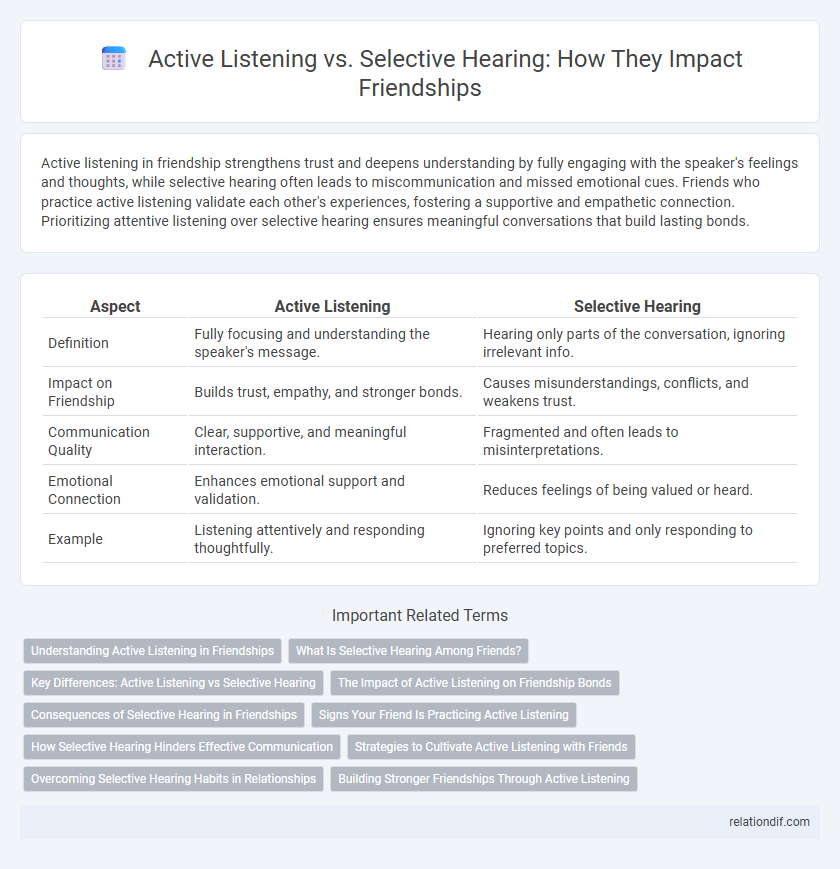Active listening in friendship strengthens trust and deepens understanding by fully engaging with the speaker's feelings and thoughts, while selective hearing often leads to miscommunication and missed emotional cues. Friends who practice active listening validate each other's experiences, fostering a supportive and empathetic connection. Prioritizing attentive listening over selective hearing ensures meaningful conversations that build lasting bonds.
Table of Comparison
| Aspect | Active Listening | Selective Hearing |
|---|---|---|
| Definition | Fully focusing and understanding the speaker's message. | Hearing only parts of the conversation, ignoring irrelevant info. |
| Impact on Friendship | Builds trust, empathy, and stronger bonds. | Causes misunderstandings, conflicts, and weakens trust. |
| Communication Quality | Clear, supportive, and meaningful interaction. | Fragmented and often leads to misinterpretations. |
| Emotional Connection | Enhances emotional support and validation. | Reduces feelings of being valued or heard. |
| Example | Listening attentively and responding thoughtfully. | Ignoring key points and only responding to preferred topics. |
Understanding Active Listening in Friendships
Active listening in friendships fosters deeper emotional connections by fully concentrating on, understanding, and responding to a friend's words without interruption or judgment. This practice enhances empathy, trust, and communication clarity, distinguishing it from selective hearing, which may lead to misunderstandings and weakened bonds. Developing active listening skills is essential for maintaining supportive and meaningful friendships.
What Is Selective Hearing Among Friends?
Selective hearing among friends refers to the tendency to focus only on specific parts of conversations that align with personal interests or beliefs, while ignoring other important details. This behavior often leads to misunderstandings and weakened trust because key emotional or contextual information is missed. Cultivating active listening instead fosters deeper connection and empathy by fully engaging with and valuing the friend's shared thoughts and feelings.
Key Differences: Active Listening vs Selective Hearing
Active listening involves fully concentrating, understanding, and responding thoughtfully to a friend's words, fostering genuine connection and trust. Selective hearing, by contrast, occurs when one only hears what interests them, ignoring important details that may affect the friendship's depth and mutual respect. This key difference highlights that active listening strengthens relationships, while selective hearing can lead to misunderstandings and weakened bonds.
The Impact of Active Listening on Friendship Bonds
Active listening strengthens friendship bonds by fostering trust, empathy, and genuine understanding between individuals. This practice reduces misunderstandings and encourages open communication, which deepens emotional connections and promotes long-term loyalty. Friends who engage in active listening experience enhanced support and mutual respect, vital for sustaining meaningful relationships.
Consequences of Selective Hearing in Friendships
Selective hearing in friendships often leads to misunderstandings and diminished trust, as important feelings or concerns may be overlooked. This behavior can cause emotional distance, creating barriers to genuine connection and mutual support. Over time, persistent selective hearing undermines the foundation of empathy and communication essential for maintaining strong, healthy friendships.
Signs Your Friend Is Practicing Active Listening
Active listening in friendships is evident when your friend maintains eye contact, nods affirmatively, and responds thoughtfully to your words. They ask relevant questions, paraphrase your points, and avoid distractions such as checking their phone during conversations. These signs demonstrate genuine engagement and a commitment to understanding your feelings and perspectives.
How Selective Hearing Hinders Effective Communication
Selective hearing undermines effective communication by causing important details and emotions to be missed, leading to misunderstandings within friendships. Ignoring or filtering key messages disrupts trust and prevents genuine connection, weakening the bond between friends. Active listening, in contrast, fosters empathy and clarity, enabling deeper and more meaningful interactions.
Strategies to Cultivate Active Listening with Friends
Cultivating active listening with friends involves fully focusing on their words, maintaining eye contact, and providing affirming responses to show genuine interest. Employing techniques such as paraphrasing, asking clarifying questions, and minimizing distractions enhances mutual understanding and emotional connection. Consistently practicing these strategies fosters trust and strengthens the overall quality of friendships.
Overcoming Selective Hearing Habits in Relationships
Active listening strengthens friendships by fostering genuine understanding and empathy, whereas selective hearing often leads to misunderstandings and emotional distance. Overcoming selective hearing habits requires mindful engagement, such as maintaining eye contact, asking clarifying questions, and summarizing the speaker's points to ensure accurate comprehension. Practicing these techniques consistently helps build trust and deeper connections in relationships.
Building Stronger Friendships Through Active Listening
Active listening fosters trust and emotional connection by fully engaging in conversations, acknowledging emotions, and providing thoughtful responses. Unlike selective hearing, which can lead to misunderstandings and weakened bonds, active listening ensures friends feel valued and understood. Consistent practice of active listening enhances communication quality, deepens empathy, and builds stronger, more resilient friendships.
Active Listening vs Selective Hearing Infographic

 relationdif.com
relationdif.com